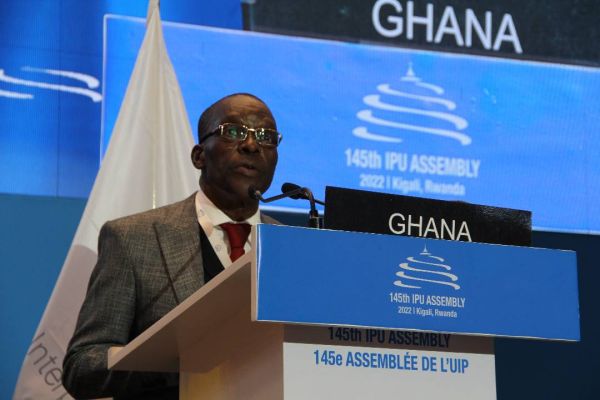The Speaker of Parliament, Alban Kingsford Sumana Bagbin, has urged the government to invest in local infrastructure for Parliament to enhance its work and preserve the gains chalked up under democracy.
He said unlike the judiciary and the executive arms of government, Parliament has been sidelined “and even lost all our properties.”
Currently, the speaker said, Parliament was struggling to get its lands to be able to put up some structures to accommodate it.
“The residence of the Speaker was almost sold to the private sector.
Actually, it was sold to the private sector.
It was when they went to register it that Lands Commission identified that to be the residence of the Speaker.
“Luckily, I was inside so I was saved,” the Speaker said.
Speaker’s Breakfast Forum
The Speaker disclosed this in Accra yesterday during the “Speaker’s Breakfast Forum” aimed at consolidating the relationship between parliament and Civil Society Organisations (CSOs) and explore new ways of working together for accountable governance.
The forum, on the theme: “Thirty years of Parliamentary democracy under the Fourth Republic: Reflections on citizens’ engagement and the way forward”, also formed part of Parliament’s celebration of 30 years of uninterrupted parliamentary democracy.
It was with support from Star Ghana Foundation, which was also marking its fifth anniversary.
Constituency offices
The Speaker said Parliament, unlike the judiciary and the executive, was the only institution which did not have offices across the country, apart from Accra.
“Parliament is not visible anywhere as an institution, that is why we are really keen on building not only constituency offices for Members of Parliament but also see how we can get structures for regional offices.
“The failure as a nation to prioritise this has resulted in MPs operating without offices in their respective constituencies,” he told the forum.
The Speaker said the plan to have an office for MPs in their constituencies has not seen the light of day.
“MPs look for their own means of transportation and reach out to their constituents.
They organise and fund all activities but we expect them not to be corrupt,” he said.
Engagement
Mr Bagbin, who touched on a number of vexed national issues, also lamented the limited engagement between MPs and the public.
That, he said, had created a disconnect between MPs and the public, making it difficult for the latter to appreciate the work of Parliament and MPs.
He revealed that as a result, while internationally the Parliament of Ghana was rated 88 per cent as being an effective instrument of keeping government in check, locally the CDD-Ghana Afro Barometer gave Parliament only eight per cent.
As a result, he said, the choice of an MP was influenced by some considerations and not competence or care for the people.
This, the Speaker said, accounted for the high attrition rate of MPs who get rejected for all the wrong reasons at the polls.
The Speaker said regular engagement with constituents was an integral part of representative democracy and must be used as an effective tool for citizens’ participation in decision-making.
“I believe this would foster transparency and accountable governance.
“Regular and structured engagement, including regular constituency visits by MPs with citizens, help to know how we have performed and what we can do to better our work,” the Speaker said.
Reforms
In line with this, the Speaker said Parliament had undertaken a number of reforms and restructuring to make it more engaging.
They included the breakdown of its Public Affairs Department into three — media relations, public engagement and television, he explained.
Also, there was a department on Citizens Bureau to better engage the public and CSOs and think thanks, the Speaker said.
As a result, the Parliamentary Service Board has approved a new organogram which includes revised Standing Orders to take effect before the House goes on break on December 22.
Under the new Standing Orders, committee sittings will be open to the public and the media.
Also, the Citizens Bureau is facilitating the development of a manual titled: “Working with Parliament of Ghana, a guide to CSOs.”
The manual, apart from serving as a reference material for CSOs working on Parliament, would be an important resource for building the capacities of CSOs better, the Speaker said.
The Bureau had also been working to complete the “Open Parliament Action Plan,” he added
That, Mr Bagbin said, would be inaugurated before the end of the month to create a government partnership caucus in Parliament to ensure that the House exercised stronger oversight over the partnership.
Source: graphiconline.com
| Disclaimer: Opinions expressed here are those of the writers and do not reflect those of Peacefmonline.com. Peacefmonline.com accepts no responsibility legal or otherwise for their accuracy of content. Please report any inappropriate content to us, and we will evaluate it as a matter of priority. |
Featured Video

















